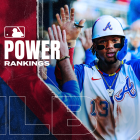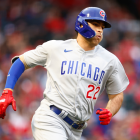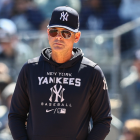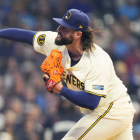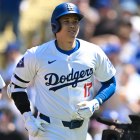Slowly, ever so slowly, the free-agent market is starting to loosen up. Shohei Ohtani found a home. So did Carlos Santana, Zack Cozart, CC Sabathia, Jake McGee, Mike Minor, Joe Smith, Anthony Swarzak, Juan Nicasio, Pat Neshek, Tommy Hunter …
... OK, that's a lot of relief pitchers, to be fair. Still, we've at least started to see some movement. But one class of players remains a complete mystery as we enter the final few days before Christmas. Given what we've seen over the past three decades, it's exactly the class of players you would expect to be sitting in the shadows. It's the full roster of Scott Boras clients.
No agent publicly advocates for his clients with more gusto than Boras. He has labeled J.D. Martinez as King Kong, and pushed a $200 million price tag for his services. He has swatted away advanced defensive metrics, because they don't at all agree with the four Gold Gloves Eric Hosmer has won in the past five seasons. And he has called Jake Arrieta a "big squirrel with a lot of nuts in his trees." We're not quite sure what that Arrieta description means, but it makes for delightful copy, and it's consistent with an agent who goes to great lengths to meet his clients' wishes.
If the slow-play for Martinez, Hosmer and Arrieta (as well as next-tier free agents Carlos Gomez and Carlos Gonzalez) sounds familiar, it should.
The most striking example of Boras successfully waiting out a free-agent market happened six winters ago. Prince Fielder was coming off a stellar season in which he bashed 38 homers, knocked in 120 runs, hit .299/.415/.566 and finished third in MVP voting. Problem was, teams were starting to better understand how to evaluate players on the open market. As fearsome as Fielder was at the plate, he was a defensive liability, one of the worst base-runners in baseball and a player whose body type didn't bode well for continued success. General managers, the usually cool-headed decision makers who had historically made the call on how much to spend on talent, weren't necessarily going to back up the Brinks truck to land Fielder's services.
So Boras simply went around those general managers. Instead, he sussed out the handful of team owners who could be persuaded to think with their hearts and not their heads. He further narrowed that list down, identifying Mike Ilitch as a prime target for his seductive pitch. The Tigers owner desperately wanted to win a World Series. He already employed two handsomely paid superstars in Miguel Cabrera and Justin Verlander. And he was 83 years old, keenly aware of his mortality and how tough it could be to win it all. Here was a man committed to winning who might be willing to spend far more than anyone else would, if only to raise those hopes for postseason glory.
The result: Fielder inked a nine-year, $214 million megadeal that remains one of the 10 biggest ever signed by a baseball player. That number of years and dollars was shocking enough. What really made everyone's heads spin, though, was the timing. Fielder signed that contract on Jan. 26, 2012, six weeks after the Winter Meetings and long past the point at which free-agent bonanzas typically happen. (Victor Martinez's season-ending knee injury that January might have also inspired the Tigers to splurge on Fielder.)
There's no question that this Hot Stove season has been especially slow to develop. Part of that quagmire has been caused by trade rumors complicating things considerably. When teams think they might have even a faint shot at landing someone like Manny Machado or Josh Donaldson, they might not be rushing to sign lesser players until those trade dominoes fall. Indeed, strip out Boras clients and you still have a logjam of quality free agents keeping their powder dry until the market starts to develop. That list includes Yu Darvish, Lorenzo Cain, Mike Moustakas, Alex Cobb, Todd Frazier, Jay Bruce, Lance Lynn and numerous others.
But the bottom line is that Boras again holds many of the winter's best cards. And he's again going right to the top to shop his clients. Last week in Orlando, Florida, Boras announced that he and his tireless staff had produced a 75-page binder on Arrieta that was making the rounds among major-league teams. Only instead of landing in the hands of general managers or other baseball operations staff, the binders were sent directly to team owners -- that group of sentimental billionaires who might go Full Ilitch and outbid everyone else by tens of millions of dollars.
Here's a brief look at those top three available Boras clients, their strengths and weaknesses and what might happen to them in the next few weeks:
- Strengths: Led the majors in homers per at-bat and slugging average last season
- Weaknesses: One of the worst outfield defenders in the league
When Major League Baseball keeps setting new home-run records year after year, and the likes of Justin Smoak, Logan Morrison and Yonder Alonso can suddenly become impact power hitters, you wonder how high teams will go on power bats. Last winter, Edwin Encarnacion and his agent thought they could land $100 million thanks to years of elite slugging. He got $60 million. Several other mashers also got far less than expected. Forget Fielder; Boras client Chris Davis' seven-year, $161 million deal looks like something conjured in some parallel universe. Except that deal happened less than two years ago. It was another late signing too, coming on Jan. 21, 2016.
Granted, the Yankees were willing to potentially pick up close to $300 million in salary commitments to land Giancarlo Stanton. But Stanton is more than two years younger than Martinez, with a better glove and more athleticism. The Red Sox, led by president Dave Dombrowski, have thus far refused to go to the moon for Martinez, despite their acute need for more power. It's not clear which other team might break the bank for an over-30 defensive liability whose best skill seems like it can be found under every second rock.
Of course that's what the landscape looked like when Fielder splashed the free-agent waters. And when Davis did the same. Martinez might not get his $200 million. But given Boras' track record, who's to say Kong will get much less?
- Strengths: Great contact hitter, incredibly durable
- Weaknesses: Inconsistent bat overall (wRC+ last four years: 98, 124, 102, 135)
Even if we acknowledge that defensive metrics might sometimes be squirrelly for first basemen, Boras can't deny that Hosmer's power has never been anything special for the high-power position of first base. So Boras has started talking up Hosmer's "prestige value," portraying him as the linchpin of the Royals' great 2014-15 run, while conveniently omitting the impact that Cain, Moustakas and a monster bullpen had on those same teams.
Again, we can't know for sure if one easily swayed owner might find a ninth figure in his checkbook. But Hosmer's good-but-not-great skill set, combined with the glut of bats available both via trade and free agency, make you wonder if he'll get the bucks he wants.
- Strengths: Two seasons removed from a pretty excellent Sandy Koufax-in-his-prime impression
- Weaknesses: Two straight years of sharp decline
Boras is selling both track record and potential here. Arrieta will be 32 years old in March, and pitchers that old almost always make terrible long-term investments. Despite Arrieta's relatively advanced age, he has tossed a relatively paltry 1,161 career regular-season innings, a light workload that could theoretically prolong his shelf life as a quality pitcher. But his crossfire delivery is also a high-maintenance beast, one that saw him lose both velocity and command last season.
Can Arrieta get back anywhere close to Cy Young form? Or is his ceiling now his 2017 level, one that produced just barely better-than-average results, with ugly outcomes likely to follow as he hits years three, four and five of whatever new contract he signs? So many teams badly need reliable starting pitching, Arrieta might get a massive payday regardless. Just don't count on him being worth the money.




















